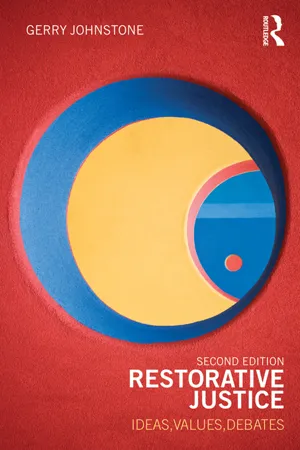
- 186 pages
- English
- ePUB (mobile friendly)
- Available on iOS & Android
About this book
Restorative justice is one of the most talked about developments in the field of crime and justice. Its advocates and practitioners argue that state punishment, society's customary response to crime, neither meets the needs of crime victims nor prevents reoffending. In its place, they suggest, should be restorative justice, in which families and communities of offenders encourage them to take responsibility for the consequences of their actions, express repentance and repair the harm they have done.
First published in 2002, Restorative Justice: Ideas, Values, Debates is renowned worldwide as an accessible, balanced and invaluable analysis of the argument that restorative justice can provide an attractive alternative to traditional responses to crime.
The second edition includes a new chapter identifying and analyzing fundamental shifts and developments in restorative justice thinking over the last decade. It suggests that the campaign for restorative justice has not only grown rapidly in the last decade, but has also changed in its focus and character. What started as a campaign to revolutionize criminal justice has evolved into a social movement that aspires to implant restorative values into the fabric of everyday life. This new edition explores the implications of this development for restorative justice's claim to provide a feasible and desirable alternative to mainstream thinking on matters of crime and justice.
This book provides an essential introduction to the most fundamental and distinctive ideas of restorative justice and will appeal to students of criminology, law or related disciplines or researchers and professionals with an interest in crime and justice issues. In addition it extends the debate about the meaning of restorative justice – pros, cons and wider significance – hence it will also be of interest to those already familiar with the topic.
Tools to learn more effectively

Saving Books

Keyword Search

Annotating Text

Listen to it instead
Information
Table of contents
- Cover
- Half Title Page
- Title Page
- Copyright Page
- Table of Contents
- Preface to the second edition
- Preface to the first edition
- 1 Introduction
- 2 Central themes and critical issues
- 3 Reviving restorative justice traditions
- 4 Healing the victim
- 5 A restorative approach to offenders
- 6 Shame, apology and forgiveness
- 7 Mediation, participation and the role of community
- 8 The future of restorative justice
- 9 The developing character of restorative justice
- Appendix: The theological roots of judicial punishment
- References
- Index
Frequently asked questions
- Essential is ideal for learners and professionals who enjoy exploring a wide range of subjects. Access the Essential Library with 800,000+ trusted titles and best-sellers across business, personal growth, and the humanities. Includes unlimited reading time and Standard Read Aloud voice.
- Complete: Perfect for advanced learners and researchers needing full, unrestricted access. Unlock 1.4M+ books across hundreds of subjects, including academic and specialized titles. The Complete Plan also includes advanced features like Premium Read Aloud and Research Assistant.
Please note we cannot support devices running on iOS 13 and Android 7 or earlier. Learn more about using the app